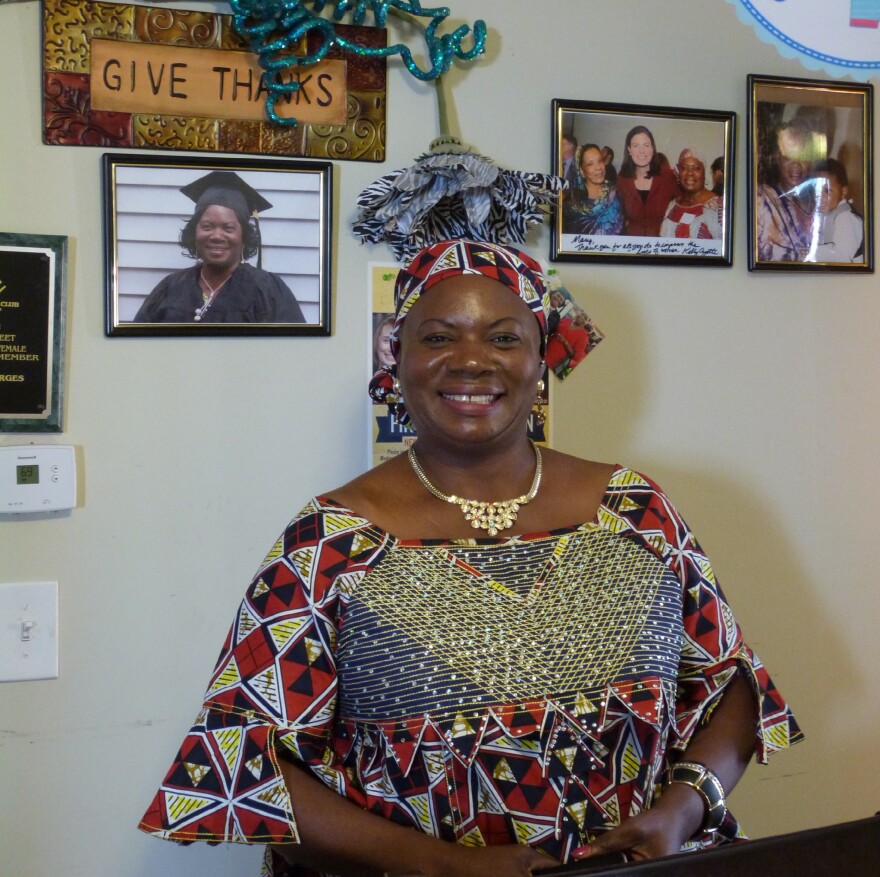Manchester has become an increasingly diverse city in recent years, due in large part to an influx of refugees and immigrants. The political leadership of the city, however, has so far barely reflected its changing demographics.
This changed in small measure last month, when a woman from the Democratic Republic of Congo was elected to the city’s school board. Mary Ngwanda Georges is also the first African immigrant elected to municipal office in New Hampshire.
That education is important to Georges is clear from the moment you enter her house, on the edge of downtown Manchester. The place is adorned with trophies and honors earned by her children who attended city schools from elementary through high school. The other thing that’s clear from the decor is that Georges is a woman of faith, a devout Christian and a minister at a local Pentecostal church.
Having viewed the contentious way the Manchester school board often operates, Georges decided it was the right place for her.
“Yes, as a minister, I’m going to bring peace," Georges said. "Because I don’t see: Why fight, why they don't respect each other? It’s not for us; it’s for the children.”
Georges came to the United States from Congo in 1990. She first went to Los Angeles before settling in Manchester after meeting her husband. She worked as a dry cleaner, took English classes and eventually got her master’s degree in organizational leadership.
Along the way, Georges became a kind of liaison for the growing number of immigrants and refugees from Africa — many of them fleeing war in Somalia and Sudan.
Those newcomers are one factor behind the changing student demographics of Manchester's schools. The percentage of nonwhite students in the district has grown considerably over the past decade, to more than a third of the total enrollment, according to a 2014 report by New Hampshire Center for Public Policy Studies. Many of the students are not only English learners, but, in the case of refugees, have very limited financial resources and families that are struggling to adapt to modern Western culture.
Georges says that many of these families expect schools to do more to guide their children and keep them out of trouble. In many parts of Africa, she says, parents -- no matter how poor -- must pay school tuition, and both parents and school leaders take a hard line with students.
“Kids cannot do what they want," Georges said. "They are kids. I am today who I am because of my mom. . . . My mom didn't go to school, my dad didn't go to school, but they knew that it was important for me to go to school.”
Georges doesn’t see racism at the heart of the challenges facing minority and immigrant students in Manchester. Rather, she says more needs to be done improve communication with these families and better explain how, as she says, the system works — how to get into college and find a career.
In this regard, another big problem, she says, is the practice of leveling — putting kids in academic tracks that can end up being ruts for students throughout their schooling.
“For me it’s not discrimination, because I cannot say, 'Those kids in level 1 or level 2 is just black kids,'" Georges said. "There is some white kids too. I can say there are parents who are really educated who know what to do with their children.”
Still, it bears noting, despite Georges’ election, the Manchester school board and the district staff and administration remain overwhelmingly white. But as veteran school board member Kathy Staub notes, the significance of Georges’ election will go beyond the single vote she will wield on the 15-member school board.
“She going to be going into the schools," Staub said. "The students there are going to see her as an elected official, and the parents are going to see that there’s some representation for them on the school board, so that there’s some acknowledgment that they’re part of the community now.”
Of course, Manchester politics have long been a clubby affair, but over the decades new groups have found their way into power. Bob Baines, the former mayor and longtime principal at West High School, saw the election of Georges as a sign that the city was making way for new immigrants, much as it has throughout its history.
“There used be strong Franco-American representatives on the school board," Baines said. "The Irish community was represented in politics. It’s something I’ve seen in my almost seven decades that I’ve been in the city. You see the changing demographics of the city, and you see them gradually getting involved in political life.”
How Georges fares in the city’s rough and tumble political ring remains to be seen. But her faith and willingness to express her opinion may indeed serve her well when she takes her seat on the school board in January.








